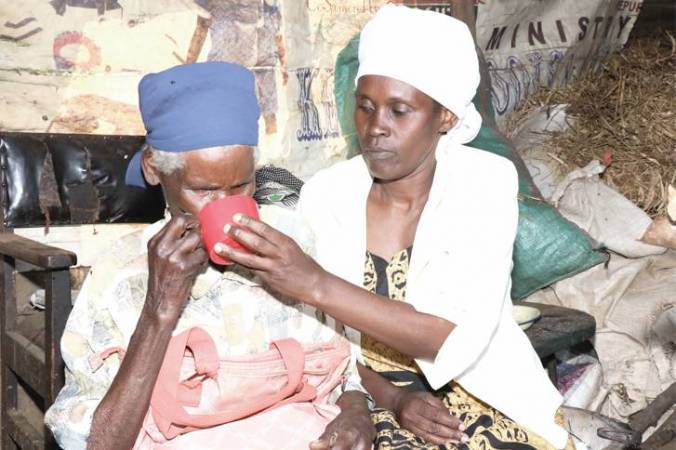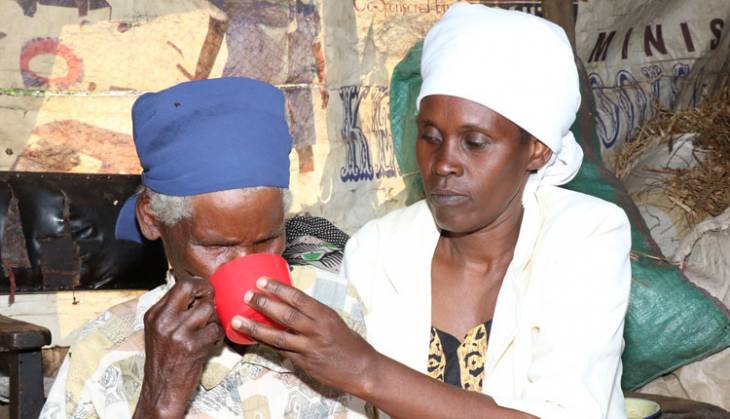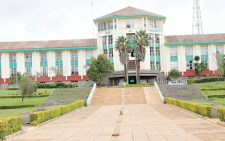From scavenger to minder of the elderly

Scavenging on rubbish dump sites for food and survival at the country’s capital had been the norm for Peninah Wambui, 48, for over a decade.
She used whatever tools fate hurled her way and embarked on a roller coaster to hell and back as she struggled to feed her nine children deep in the heart of Nairobi.
Back then, one could easily locate Wambui at the KCC Umoja Cherina dumpsite, as she lined up her children in search of food and as a form of escapism.
Wambui was not always poised to become a human scavenger, however, life struggles, poverty and early marriage accelerated the path to the dumpsite.
Stigma and shame
Born in Murinduku area at the border of Embu and Kirinyaga counties in 1974, Wambui’s journey seemed well until she dropped out of school in Class Six, a decision she regrets to date.
She fell in love, conceived and decided to start a family at the expense of furthering her education.
“I got a job as a house help in our area, taking care of children and it was a tough encounter to even remember,” she said.
She says frequent harassment by her employer, low income and stigma from locals who viewed her as a bad influence to the girls in the community forced her to quit the job.
“I came to Nairobi with a view of changing my life, but that town is hard if you do not have anything to do. It is just unbearable,” she explains.
She used to arrive at the dumpsite as early as 5am to get waste food from hotels before it got mixed with dog food. Interestingly, none of them got sick as a result of eating such food.
Her life would later change in 2013, after she was spotted by non-governmental organisations who offered community development training to try and keep her off the streets.
Good Samaritan’s rescue
“I was trained on business, community health volunteering and location advisory council to deal with children. This was a turning point in my life,” says Wambui.
She was taken through programmes on how to care for the elderly and the sick in hospitals, a point, she says, grew a seed of aiding the less fortunate.
Months later, she moved to Wanyororo B, in Nakuru county to further her passion. Through the programme, Wambui has earned the name ‘Mother Theresa’ simply because her work has been recognised by the locals.
“Apart from being a caregiver, I am a farmer, a businesswoman and a social worker. I am not where I am supposed to be, but I’m still trying,” she says.
Despite being passionate for the job, Wambui acknowledges some serious challenges including balancing all the three jobs. In her weekly calendar, she has set aside every Friday for checking in on the elderly who have no one to look after them.
“Some elderly people I have visited have no food and I have to bring in whatever I find to ensure they do not go hungry,” she says.
Leah Nyaruwai Munyua, a beneficiary of Wambui’s social programme, reveals that they have built a strong bond saying she considers her one of her children as she never goes hungry.
“She brings me food among other things. We are the best of friends, and I want to bless her since many of those of my age are still suffering,” says Munyua.
Wambui now wants the national and county governments through their relevant departments to join in and assist her in her job to reach more elderlies in Nakuru.
“Also, if well-wishers could chip in and assist in this journey, I will be so glad. These are our mothers and fathers with no one to look after them,” adds Wambui.
Josephine Kanyi, a Nakuru resident, backs Wambui’s call, saying she needs all the support to reach more people.
“She is from humble background. Having gone through hell and back, she has a pure intention of assisting people,” said Kanyi.
Wambui reveals that there has been a number of dissenting voices including her family who constantly tell her to assist herself first considering that she was a street woman before.
“I want to be faithful to God so that he can be faithful to me, so whatever I am doing is all in line with what a Good Samaritan would do,” she added.
In Bahati sub-county alone, she reveals, the elderly have been abandoned by their families with some facing a tough time through abuse saying it is hard for them.
“Even if your parents were so harsh on you while you were growing up, do not use revenge to get back at them while they are old, these people hold the power to bless or curse you,” says Wambui.
A number of locals in the area have slowly started appreciating her work with some allowing her to stay with their sick and elderly patients in hospitals.













